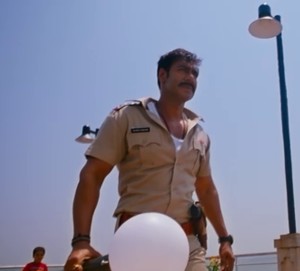Singham
 Bajirao Singham’s “style of working” (hang on while I put on my Aviator sunglasses) is not a style, so much, as a mandate, where that mandate is to do whatever the hell you want. Rohit Shetty’s immensely popular 2011 film, Singham (“Lion”) is a remake of an earlier Tamil film. It stars Ajay Devgn as the titular character, the only honest cop in a nation so corrupt it would make Kevin Spacey’s Frank Underwood slightly uncomfortable. The film begins with a lion’s roar and, having set that tone, follows Devgn (often in slow motion) as he walks dramatically at things. Singham is, in fact, introduced with a colorful musical number of which he is, strangely, an active participant — an act of self-aware parody that strides a fine line between awesome and ridiculous.
Bajirao Singham’s “style of working” (hang on while I put on my Aviator sunglasses) is not a style, so much, as a mandate, where that mandate is to do whatever the hell you want. Rohit Shetty’s immensely popular 2011 film, Singham (“Lion”) is a remake of an earlier Tamil film. It stars Ajay Devgn as the titular character, the only honest cop in a nation so corrupt it would make Kevin Spacey’s Frank Underwood slightly uncomfortable. The film begins with a lion’s roar and, having set that tone, follows Devgn (often in slow motion) as he walks dramatically at things. Singham is, in fact, introduced with a colorful musical number of which he is, strangely, an active participant — an act of self-aware parody that strides a fine line between awesome and ridiculous.
Eye-copulating the camera from behind his sunglasses as he walks dramatically forward, sideways, and forward again, Devgn invites the viewer to contemplate just how tightly tailored his uniform is… but only after he emerges from a spiritual bath (in Singham Returns, I believe he might actually be bathing in the Ganges). Making tiger-claw motions at the fourth wall, Singham is daring you to challenge him while warning you not to take him up on this foolish proposition. For Singham fights with all the unabashed recklessness of a cartoon character, tiger-slapping his enemies on the head (complete with video-game coin-noises) and bouncing human bodies about the landscape in an orgy of dramatic, slow-motion walking, clawing, and more walking. Have I mentioned the slow-motion dramatic walking while staring? Because for the love of Ganesh, there is an awful lot of that. I mean really a lot.
If your initial reaction to being threatened by a group of thugs is anything other than, “Tear out the nearest lamp post and use it as a mace to beat them senseless,” you’re not thinking like Singham. What would Singham do when menaced by a powerful politician? He’d tell that politician he had planted a bomb in the man’s car, that’s what. How does Singham cope with a corrupt system? By planting evidence in his enemies’ cars and then arresting them to show them that corruption doesn’t pay, of course. In the first Singham, his soon-to-be-trademarked “Now I’ve lost it” catchphrase seems almost like a throw-away line… but don’t worry, by the time we get to the sequel, they’ll be hammering that bit like a sorority girl on a winery tour.
A movie like Singham has two touchstones. One is its physical confrontations, the centerpiece of which is a vengeful Singham tearing the aforementioned lamp pillar from a railing and using it as a mace to beat multiple enemies. The other is the movie’s politics, key to which is a vengeful Singham beating powerful people he probably ought not be beating because of the degree of trouble this is bound to cause later in the movie. Singham isn’t happy if he’s not creating ancillary property damage (he never throws a guy through the air if can can throw a guy through the air and through a windshield or plate glass window) — and he never, ever considers the implications of his actions. It’s as if his decision tree goes only as far as, “Hey, I could just tiger-slap this a-hole,” and all other branches fall away once this determination has been made. He’s like a Hindi Jack Bauer with a brain injury, stuck in forward gear and oblivious to the difficulty he’s going to cause himself.
Given this, the fact that the plot of the film revolves around a scheme by a powerful villain to intimidate Singham psychologically (said villain successfully drove a previous police officer to suicide) seems almost dead on arrival. Singham has no psychology to intimidate; he faces every problem by putting on or taking off his sunglasses and slowly walking toward (or away) from it (before or after beating it soundly about the head and neck with his open hands). You can’t bribe him. You can’t scare him. You can’t make him wear a pair of pants that is not a size too small. You can only get out of his way and hope you haven’t offended him when, as he eventually will, he reaches the conclusion that the only solution to his current set of problems is to drive to your house and murder you while his fellow officers look the other way. Bollywood musical finish!

